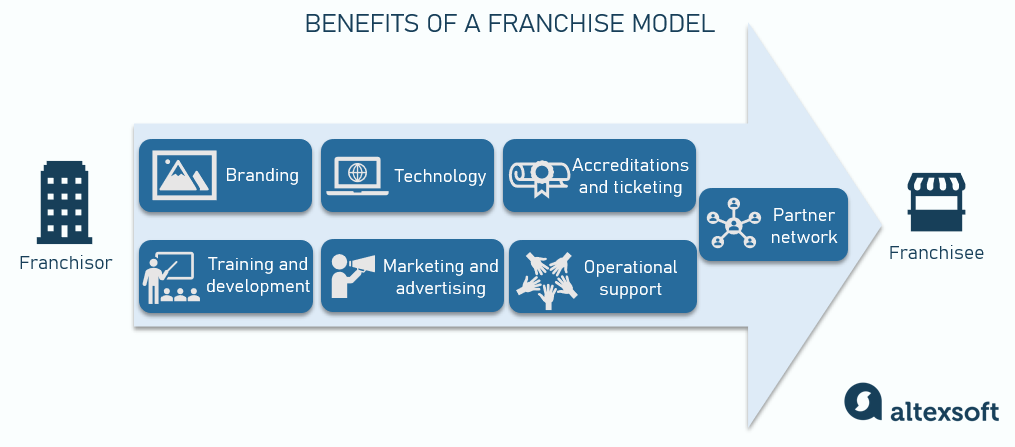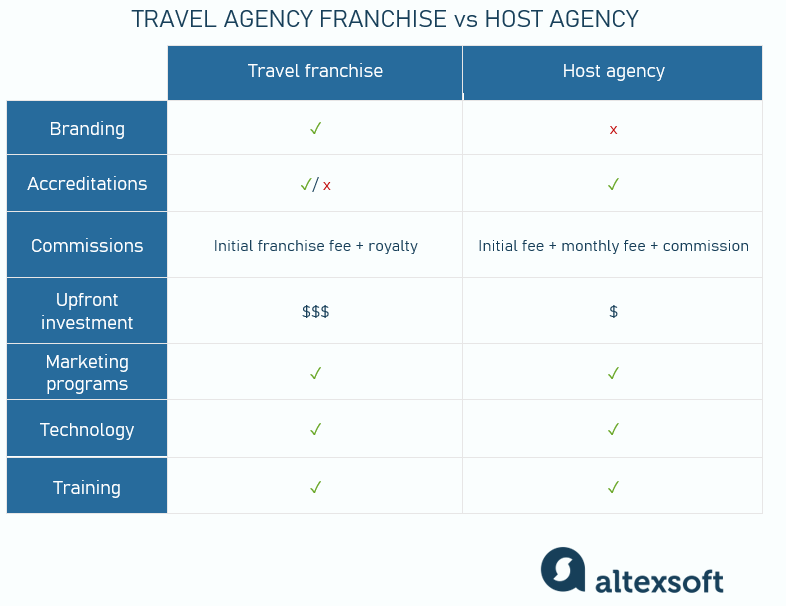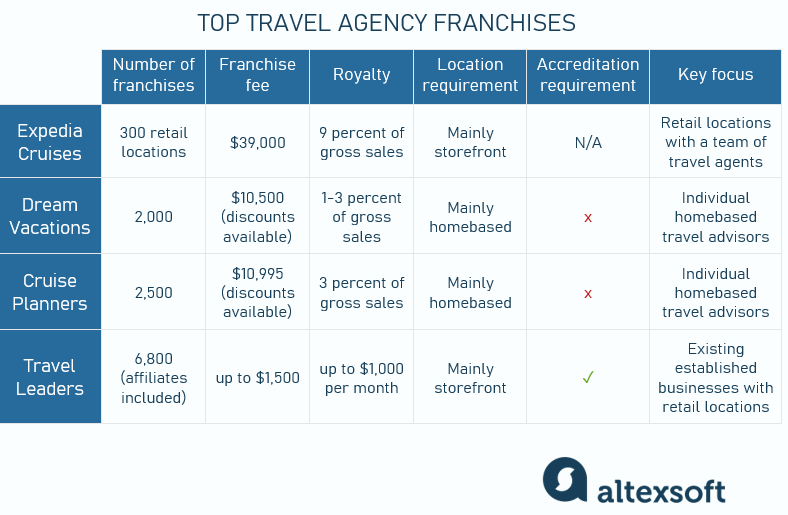In 2024, UNWTO expects global travel to recover completely from the pandemic and finally exceed 2019 levels. At the same time, one of the main industry trends is the growing demand for comprehensive and personalized travel services. Tourism presents a lucrative opportunity for entrepreneurs – and one way to enter the industry is through a franchise model.
Franchising in the travel sector offers independence while operating under an established brand. Some well-known names in the industry are Expedia Cruises, Dream Vacations, Cruise Planners, and Travel Leadres. Let’s delve into the nuts and bolts of travel agency franchises and, among other things, discuss how to start and what to expect.
This article mainly targets those considering buying a travel franchise and launching their own agency, but it will also be useful for established businesses wanting to become a franchisor and develop their brand.
What is a travel agency franchise?
A travel agency franchise is a business arrangement in which you (a franchisee) start your own travel agency using the name, branding, and resources of an already established travel company (a franchisor).
Buying the right to use the promoted brand and proven operational model helps you attract customers more easily and set up business processes faster than when starting from scratch. In return, you follow the company’s rules and share some of your earnings with them.
This “business-in-a-box” model allows you to benefit from the larger travel agency's experience and support, accelerates market entry, and reduces some of the risks associated with launching a completely new business. Here’s what you – as a franchisee – can count on.
How does a franchisor support a franchisee?
A franchisor provides various types of support to its franchisees to help ensure the success and growth of their business. Here are some of the key areas.

Key benefits for a franchisee
Branding. As we said, one of the most significant advantages of a franchise is the use of a well-established brand identity. It includes logos, marketing materials, and a unified brand presence, all of which helps attract customers who will be more likely to trust a known name in the industry.
Technology. Franchisors typically provide essential technological tools to support franchisees, such as
- integrated booking systems for handling travel arrangements,
- lead generation tools,
- marketing platforms for executing campaigns and maintaining brand consistency,
- customer relationship management (CRM) software to handle and optimize customer interactions,
- analytics tools for tracking business performance, etc.
For example, Cruise Planners provides its franchisees with its proprietary CP MAXX system that is comprised of a CRM and a booking tool, a mobile app, a cruise watcher, a group registration tool, and so on. Dream Vacations has similar software capabilities. Travel Leaders also offers its own suite of booking and operations management systems.
Partner network. Franchisees benefit from pre-negotiated contracts and favorable terms the franchisor has established. Among other perks are access to bulk ticket rates and special fares that are typically not available to smaller, independent agencies. The network often includes airlines, hotels, cruise lines, tour operators, and other travel-related service providers.
Accreditations and ticketing power. Franchisors often (but not always!) provide access to necessary industry accreditations and memberships, such as CLIA, ASTA, or ARC/IATA, which can be costly and complex to obtain independently.
Training and development. Franchisors provide comprehensive training programs that cover the operational aspects of running a travel agency, the use of technology systems, customer service, travel regulations, etc. They also organize regular workshops, seminars, and masterclasses for further development. This ensures the franchisee is well-prepared to manage the business and meet customer expectations.
Marketing and advertising. Franchisees benefit from national advertising campaigns and marketing strategies designed by the franchisor. Additionally, they often receive tools and resources for local marketing initiatives tailored to their specific market.
Operational support and regulatory guidance. Franchisors offer continuous operational support from office setup to ongoing advice to improve business efficiency and profitability. They also assist in navigating the legal aspects of running a travel business, including help with licensing, compliance with travel industry regulations, and so on.
Other benefits of working with a franchisor include access to exclusive deals and offers from travel suppliers (such as free promotional tours for agents), as well as a community of fellow franchisees who can share their experiences.
This comprehensive support framework provided by a franchisor helps franchisees start a new business and contributes to their overall success and growth. In return, franchisees
- pay the agreed-upon fees,
- adhere to the franchisor’s guidelines to ensure consistency across the brand network,
- maintain the parent company's reputation by providing high-quality service, and
- contribute to the network growth and market expansion.
If you’re familiar with how the travel market is organized, you might notice the similarity between franchising and working with a host travel agency. But these types of partnerships are different. Let’s talk about the nuances.
Travel agency franchise vs host travel agency model
Both travel agency franchises and host travel agency models offer support in running a travel business, but they operate differently.

Franchise and host models compared
In a travel agency franchise, you buy the right to use an established travel company’s brand, systems, and resources. You run your own business but under the company's name, following their rules and guidelines. This model provides brand recognition and a ready-to-use business blueprint.
In a franchise model, the franchisee receives payments from customers and then pays a royalty to the franchisor.
When working with a host agency, on the other hand, you operate as an independent agent with your own name having more flexibility in branding and business approach.
You use the host's accreditations (like IATA and ARC) to book travel, issue tickets, and handle other operations. The host also often provides its partners with other support and resources such as tech solutions, training, marketing programs, etc.
As for the transactional part, your host will typically collect the payments from suppliers and then transfer 50 to 90 percent to you (terms vary), keeping the rest as its commission. There’s also usually a small monthly fee.
So essentially, a franchise model is like buying a branch of a big brand, while a host model is more like partnering with a big agency to use their tools while running your own small business. The former will empower you to have your business up and running faster, but the latter allows for more flexibility and is often less costly upfront.
Please note that there’s no strict distinction as franchising and host agency agreements can come in all kinds of forms. For example, some companies act as both a franchisor and a host agency. In this case, you buy a franchise and use the credentials of the same company when booking travel (e.g., Cruise Planners). However, there are also other scenarios when you can only get a franchise if you’re already an accredited agent (e.g., that’s how Travel Leaders work).
We’ve mentioned fees that you must pay to a franchisor company. But what are those? Let’s find out.
Costs associated with a franchise model
Starting a franchised travel agency involves several types of costs. Understanding these financial obligations is crucial for anyone considering such a business setup. Here’s a breakdown of the typical costs associated with this model.
Initial franchise fee
This is a one-time fee paid to the franchisor when you sign the franchise agreement. It grants you the right to use the franchisor’s brand, system, and resources. This fee varies widely depending on the brand and can range from a few thousand to several tens of thousands of dollars.
Also, in some cases, it’s a flat, one-size-fits-all fee, while in other cases, it can depend on the location, the franchisee’s experience, or other factors. Sometimes, discounts are available for military veterans, medical workers, minorities, existing travel experts, etc.
For example, the standard Dream Vacations franchise costs $10,500, but there are 4 discount tiers that can give you 10-95 percent off.
Startup costs
Beyond the initial franchise fee, there are startup costs. These will mainly depend on whether you plan a home-based agency or a storefront one. Obviously, the first option is much cheaper as you can start off pretty much with a personal laptop and your home Wi-Fi.
Launching a brick-and-mortar agency is more costly. You’ll have to take care of office setup, initial marketing and advertising, purchasing equipment and supplies, maybe hiring other employees, and so on. These expenses depend on the location, size of the operation, and the specific requirements set by the franchisor.
To give you an idea of the initial costs range, Expedia Cruises calculates the investment of starting a storefront travel agency under their franchise to be between $197,050 and $328,745 (including the franchise fee).
Royalty fees
Franchisees pay ongoing royalty fees, which are typically a percentage of the franchise’s gross sales, though they can sometimes be a flat, fixed monthly amount. These fees contribute to the franchisor’s continued support and use of the brand name and system.
For example, Expedia Cruises charges 9 percent of gross revenue, while with Dream Vacations you’ll pay 1.5-3 percent of gross sales.
Note that most franchisors only post the barest essential information about these three categories. However, a deeper look under the hood might expose hidden costs.
Other franchise costs
More often than not, there would be a number of additional fees and expenses you’ll have to cover as a franchisee and a business owner, so be sure to read the franchise agreement carefully.
Training fees. While initial training is often included in the franchise fee, ongoing training sessions or advanced training programs might incur additional costs. You might also need to plan for travel expenses if the training is offline.
The training fees depend on your experience and the complexity of the programs. In some cases, you might only need zero-cost online training, while in others, the price may range from several hundred to several thousand dollars.
Technology fees. Some franchisors charge fees for the use of their proprietary software.
Here, again, fees vary wildly across franchisors (or, sometimes, external vendors) and the number of users and can be as low as $50 to thousands of dollars annually.
Renewal/transfer fees. When a franchise agreement term ends, continuing the franchise might require paying a renewal fee. Some franchisors might also charge you for terminating the agreement early. A transfer fee is incurred if you want to transfer the business to a different person.
For example, the renewal fee can cost up to $5,000 and the transfer fee can be as high as $10,000.
In addition to the costs you pay to the franchisor, don’t forget about other ongoing expenses such as
- operational costs (salaries, utilities, etc.),
- E&O insurance (often purchased through a franchisor),
- legal services,
- business permits and licenses,
- membership fees,
- renovation, etc.
These costs add up, so potential franchisees should conduct thorough research and prepare detailed financial projections to ensure the feasibility of their investment in a travel agency franchise. And that takes us to the practical part of how to approach the franchising business at all.
How to start a travel agency franchising business?
Here's a step-by-step guide to help you navigate the franchising process and launch your travel business.

Steps of starting a travel agency franchising business
Do the research and evaluate your options
The first step is to conduct thorough research on potential franchises. Identify established travel agency brands with a strong market presence and a good reputation. Visit their websites to gather detailed information about their offerings, support systems, and franchise requirements.
Once you have a list of potential franchises, assess each option. Talk to the representatives of the brands you are interested in, watch a demo of the software they provide, and request the Franchise Disclosure Document (FDD). The FDD contains crucial information about the franchise, including fees, obligations, and financial performance.
Compare the initial investment required for each franchise, considering franchise fees, startup costs, and ongoing royalties. It's also essential to assess the support and training provided by the franchisor. Look for franchises that offer comprehensive training programs, robust marketing support, and continuous operational assistance.
Pro tip: Choose your niche.
When choosing the franchisor, think about the market niche you want to work in and how well the selected brand fits in. You might want to sell only cruises or work with full-blown tour packages. Or you can choose to organize group travel or arrange business trips. Or you might want to focus on educational travel or craft exclusive personalized luxury tours. Choosing your niche can help you better understand and cater to your target customers.
Assess your budget
After evaluating your options, assess your finances to ensure you have the necessary funds to start the franchise. Determine your budget, including all costs such as franchise fees, equipment, marketing, and working capital.
Explore various funding options, such as personal savings, bank loans, or investors, to ensure you have sufficient funds to cover both initial and ongoing expenses.
Pro tip: Make a business plan.
Consider developing a complete business plan to calculate the expected returns and define whether they justify the costs.
Do your due diligence
Due diligence is a crucial step in the process. Thoroughly analyze the franchisor’s financial health and market reputation.
Speak with existing franchisees to gain insights into their experiences and their operational results. Ask about their relationship with the franchisor, the level of support they receive, and their overall satisfaction with the franchise.
You can also consult a franchise attorney to review the FDD and franchise agreement.
Pro tip: Compare to similar businesses.
Make sure that you compare apples to apples when speaking with other franchisees. Factor in their previous experience, market niche, territory of operation, type of franchise (homebased or storefront), size of business, and other aspects that can influence the terms of an agreement and business results.
Choose the right franchise and apply for a partnership
Based on your research and due diligence, choose the franchise that best aligns with your goals, budget, and expectations. Complete the application process required by the franchisor, which may include an interview, background check, and financial review.
Once approved, carefully review the franchise agreement with your attorney. Be sure you understand your obligations, rights, and the franchisor’s commitments before signing the agreement and paying the initial franchise fee.
Pro tip: Negotiate.
Review the discount options offered by a franchisor and see if you’re qualified. Think of other reasons to negotiate with the company and secure the best deal possible. Besides discounting the franchise fee, you can discuss other benefits and incentives such as commission structure, financing options, territory rights, and so on. Remember that franchisors are also interested in getting a new franchisee so many of them are willing to adjust their fees and other terms to make them more appealing.
Prepare for launch
With the agreement signed, it's time to prepare for your travel agency's launch. Attend the training sessions provided by the franchisor, which will typically cover business operations, marketing, customer service, and the use of proprietary systems. Check the regulatory requirements for operating a travel agency in your region and make sure you comply with them.
If your franchise requires a physical location, find suitable office space and set it up according to the franchisor’s guidelines. Implement the franchisor’s marketing plan to attract customers, utilizing the provided marketing materials and strategies.
Pro tip: Choose location wisely.
The location of your travel agency is crucial for its success. Consider factors like foot traffic, visibility, and proximity to potential customers when selecting a location.
Open up and start working
When everything is in place, plan and execute a grand opening event to generate buzz and attract initial customers.
Focus on providing excellent customer service to build a loyal client base. Engage in local business networks and travel industry events to expand your reach and continuously monitor your business performance.
Seek support from the franchisor whenever needed and attend any additional training or meetings they offer.
Pro tip: Monitor the market and adjust.
Remember that the travel industry is extremely dynamic, so be sure to stay up to date with travel trends and adjust your strategy and offerings accordingly.
As you move through these stages, remember that thorough research, careful planning, and diligent execution are key to your success. Also, as you develop, make sure to monitor your performance and look for ways to enhance your operations.
Challenges of a franchised travel agency
With all the support and guidance from a franchisor, it might seem like running a franchised travel agency is a breeze. Well, it’s not exactly that way. Here are several challenges that you better be prepared for.
Initial investment. Just like any other business, starting a franchise can require a significant upfront investment, especially if you’re considering a storefront option. To avoid financial failure, it’s crucial to have a clear financial plan that incorporates franchise fees, ongoing royalties, and operational costs – as well as funding sources.
Adherence to franchisor guidelines. Franchisees must operate within the franchisor's guidelines and policies, which can limit creativity and flexibility. What seems a relief for some people, might become an unbearable restriction for others, so make sure you feel comfortable operating in the set structure.
Competition. Understanding your local market and competition is essential. Your business's success can heavily depend on its location, the demand for travel services in the area, and, of course, the level of service that will keep you one jump ahead of your competitors.
Now that you know all the pros and cons of a franchise business, let’s take a look at your options.
Top travel agency franchises
In the travel agency franchise market, several prominent companies are considered leaders due to their extensive franchise networks and comprehensive support systems that include marketing, technology, training, and operational guidance.
Notably, many travel franchises are focused on the cruise industry. That’s because the margins are generally higher in cruise sales, allowing agents to earn more. However, most franchises will enable you to sell all types of travel products.

Top travel agency franchises compared
Expedia Cruises: storefront franchising with the leading travel brand
Expedia Cruises leverages the powerful Expedia brand to offer extensive marketing and technology support to its franchisees. It has been franchising for over 35 years, emphasizing its proven success in the travel industry. It specializes in selling cruises but also works with other travel products (flights, hotels, packages, etc.).
Expedia Cruises encourages franchisees to open retail locations and create teams of travel agents (or Vacation Consultants). To qualify for a franchise, it expects applicants to have $250,000 in liquid capital and a minimum net worth of $750,000.
As we noted earlier, the initial investment range is $197,050 to $328,745 with a franchise fee of $39,000. The royalty comprises 9 percent of the gross revenue paid by suppliers. Expedia Cruises also discloses the revenue projections for the first years of operation and shares the median annual net revenue of $233,624 that mature stores (3+ years) in the US made in 2023.
Dream Vacations: a low-cost option for home-based agents
Dream Vacations is part of World Travel Holdings, one of the largest cruise distributors. However, it deals with a variety of travel services, not just cruises.
As it mainly offers a home-based franchise model, this brand is recognized for its low startup costs ($10,500 with several discount options). When joining, new franchisees have a choice of which brand they want to operate under – Dream Vacations or CruiseOne. The ongoing royalty is 1-3 percent of gross sales.
Another option is becoming an independent Dream Vacations Advisor for a $69 fee and working as a contractor with one of the established franchisees.
Cruise Planners: the biggest network of home-based franchisees
Cruise Planners was previously known as part of American Express's Travel Representative program, but in December 2022, they discontinued their partnership, and Cruise Planners joined Signature Travel Network.
With a focus on the home-based model, it has the biggest network of individual franchisees. The initial franchise fee is $10,995 (discounts exist as well), and the royalty is 3 percent of gross sales.
Travel Leaders: professional support for established businesses
Travel Leaders Network, a division of the Internova Travel Group, is different from other franchisors as it focuses on existing travel businesses with retail locations. It has strict requirements for potential franchisees, such as agency size, annual sales volume, accreditations and memberships, etc.
Depending on your business status, you can expect an initial franchise fee of up to $1,500 and a royalty fee of up to $1,000 per month. Contact them directly for more information.
Choosing the right franchise is critical to your success. Look for a franchisor with a robust support system, a strong brand, and positive franchisee testimonials. Ensure their business values align with yours, and consider their business model's growth potential.
Now that we’ve discussed all the nuts and bolts of becoming a franchisee, let’s say a few words about creating your own franchise.
How to become a franchisor?
If you run an established brand and are looking for ways to develop it, franchising is one option. Becoming a travel agency franchisor requires a careful approach to planning, legal considerations, and business strategy.
Note also that it’s likely to be a rather costly endeavor. The rates for legal, registration, and other services vary, but we will give you a rough idea of the main expenses (numbers taken from Drumm Law, LLC).
Here are the key stages of the process.
Develop your business model. Before you can franchise your travel agency, you need a successful, reproducible business model. This means your existing travel agency should be profitable and have well-defined operational procedures that can be easily taught to others.
Create a franchise system. To help your franchisees succeed, you'll need to develop a comprehensive franchise system that includes training programs, operational manuals, marketing strategies, and other support systems (if you engage external specialists, developing an operations manual can cost up to $20,000). This system should establish brand standards and quality that all franchisees will operate under.
Comply with legal requirements. Obviously, regulations vary depending on the country and state in which you operate. For example, in the United States, you might need to register a separate entity for your franchising operations, and you’ll definitely be required by the Federal Trade Commission (FTC) to draft an FDD. By the way, developing an FDD with an experienced lawyer might cost up to $30,000.
Here are the main legal aspects to comply with:
- state/federal franchise regulations (e.g., registrations or disclosures may be required),
- business licenses and permits,
- consumer protection laws,
- intellectual property laws,
- data protection regulations, etc.
To stay compliant and avoid potential legal issues, consider consulting legal and business advisors who specialize in franchising and the travel industry. Also remember that regular audits might be required to maintain the franchisor's status (and that’s also $2,000 to $3,000 paid to the auditor annually).
Market and sell your franchise. Once you have the legal aspect sorted out, develop marketing materials and strategies to attract franchisees. This includes detailing the benefits of your franchise, the support provided, and the financial investment required.
Screen applicants. Note that not everyone might be a good fit for your franchise. You’ll need a process in place to evaluate potential franchisees, ensuring they have the necessary business skills, experience, and financial resources to succeed. After all, they will present and promote your brand, so make sure your reputation is in good hands.
Train franchisees. To have a network of best-in-class travel agents, provide extensive training to new franchisees, covering everything from the day-to-day operations to customer service and local marketing. Ongoing support is also crucial to help them overcome any business challenges and to ensure quality and service standards are maintained.
Grow your network. As your network grows, monitor its performance and adjust your franchise system as needed.
Franchising travel agencies requires a significant commitment to fostering the success of your franchisees, but it can also be a rewarding endeavor that enhances your brand.

Maria is a curious researcher, passionate about discovering how technologies change the world. She started her career in logistics but has dedicated the last five years to exploring travel tech, large travel businesses, and product management best practices.
Want to write an article for our blog? Read our requirements and guidelines to become a contributor.

